You are here
Languages
 English
English Français
Français العربية
العربية
An Introduction to Global Health
Country:
Topic:
Institution:
Link to Institution:
Price (€):
Language:
Level:
Date of Start:
Date of End:
Link for Application:
Link to published material:
Keywords:
Contact details:
Course Format
The class will consist of lecture videos, which will be between 5 and 20 minutes long. Each lecture video contains integrated quiz questions. Video lectures will be given by researchers, professionals and global health practitioners from around the world - providing students with multiple perspectives. A number of interviews with global health professionals and researchers will be presented as videos. There will also be homework that is not part of the video, primarily in the form of reading short articles or text. For each topic a list of internet resources and key references will be listed for further self-study.
About the Course
Globalization processes influence the health of individuals, societies and the function of health systems in many ways and may present opportunities but may also pose a risk to vulnerable societies. Throughout this course presentations will transcend the perspectives of individual countries and will critically discuss how global mega-trends and different sectors of society influence the health of population. Transition in health and the drivers of such transition will be core elements of this course.
During the eight course weeks we will explore a range of themes, including: communicable and non-communicable diseases, environmental health, child health, reproductive health and rights, and health among refugees and displaced populations. We focus on the dual burden of communicable and non-communicable disease experienced by much of the world’s population today.
As the deadline for meeting the Millennium Development Goals (MDG’s) nears, course participants will also reflect on the post-MDG agenda by exploring the future of global health and trends in technical innovation, global strategies and programs in the fight for better health. Through lectures, readings, and assignments, course participants will be asked to think critically about the health of the world’s population and to reflect on overcoming the challenges of achieving good health around the world.



